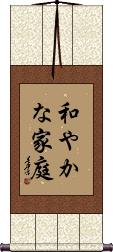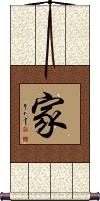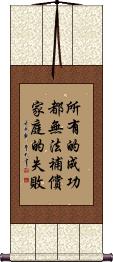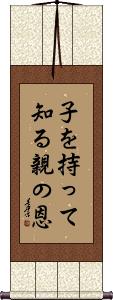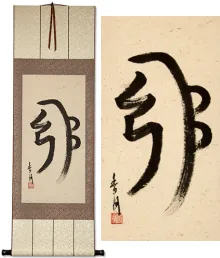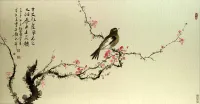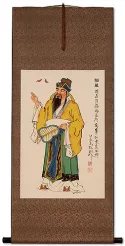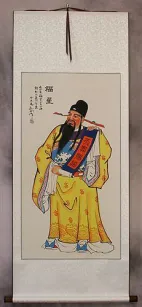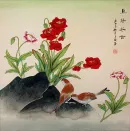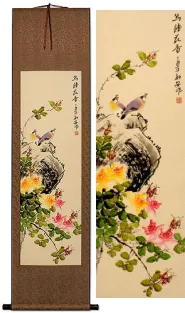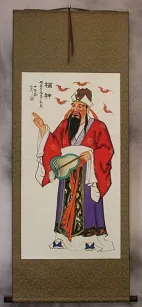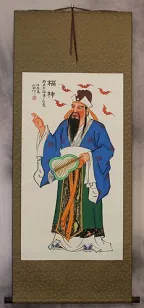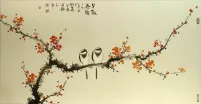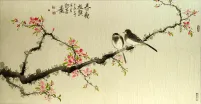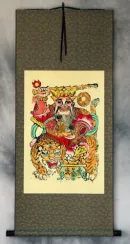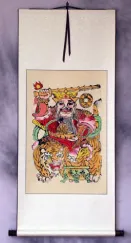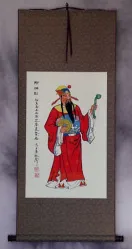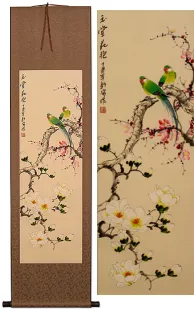Many custom options...
And formats...

Safety and Well Being of Family in Chinese / Japanese...
Buy a Safety and Well Being of Family calligraphy wall scroll here!
Personalize your custom “Safety and Well Being of Family” project by clicking the button next to your favorite “Safety and Well Being of Family” title below...
1. Safety and Well-Being of the Family
2. Happy Family
4. Happy Family
8. Any success can not compensate for failure in the home
10. No one knows a son better than the father
11. No man knows what he owes to his parents until he comes to have children of his own
Safety and Well-Being of the Family
Kanai Anzen
家內安全 is the Japanese way of saying “Family First.”
It's a Japanese proverb about the safety and well-being of your family and/or peace and prosperity in the household.
Some Japanese will hang an amulet in their home with these Kanji. The purpose is to keep your family safe from harm.
According to Shinto followers, hanging this in your home is seen as an invocation to God to always keep family members free from harm.
We were looking for a way to say “family first” in Japanese when this proverb came up in the conversation and research. While it doesn't say “family first,” it shows that the safety and well-being of your family is your first or most important priority. So, this proverb is the most natural way to express the idea that you put your family first.
See Also: Peace and Prosperity
Happy Family
和やかな家庭 means “happy family” or “harmonious family” in Japanese.
The first three Kanji create a word that means mild, calm, gentle, quiet, or harmonious. After that is a connecting article. The last two Kanji mean family, home, or household.
Note: Because this selection contains some special Japanese Hiragana characters, it should be written by a Japanese calligrapher.
Forever Family
永遠的家 is a special phrase that we composed for a “family by adoption” or “adoptive family.”
It's the dream of every orphan and foster child to be formally adopted and find their “forever family.”
The first two characters mean forever, eternal, eternity, perpetuity, immortality, and/or permanence. The third character connects this idea with the last character which means “family” and/or “home.”
See Also: Family
Happy Family
和諧之家 means “harmonious family” or “happy family” in Chinese.
The first two characters relay the idea of happiness and harmony.
The third character is a connecting or possessive article (connects harmony/happiness to family).
The last character means family but can also mean home or household.
Family Over Everything
Family / Home
家 is the single character that means family in Chinese and Japanese.
It can also mean home or household depending on context.
Hanging this on your wall suggests that you put “family first.”
Pronunciation varies in Japanese depending on context. When pronounced “uchi” in Japanese, it means home, but when pronounced “ke,” it means family.
![]() Note that there is an alternate form of this character. It has an additional radical on the left side but no difference in meaning or pronunciation. The version shown above is the most universal, and is also ancient/traditional. The image shown to the right is only for reference.
Note that there is an alternate form of this character. It has an additional radical on the left side but no difference in meaning or pronunciation. The version shown above is the most universal, and is also ancient/traditional. The image shown to the right is only for reference.
One Family Under Heaven
天下一家 is a proverb that can also be translated as “The whole world is one family.”
It is used to mean that all humans are related by decree of Heaven.
The first two characters can be translated as “the world,” “the whole country,” “descended from heaven,” “earth under heaven,” “the public,” or “the ruling power.”
The second two characters can mean “one family,” “a household,” “one's folks,” “a house” or “a home.” Usually, this is read as “a family.”
Note: This proverb can be understood in Japanese, though not commonly used.
Any success can not compensate for failure in the home
Never Give Up
The first character means “eternal” or “forever,” and the second means “not” (together, they mean “never”). The last two characters mean “give up” or “abandon.” Altogether, you can translate this proverb as “never give up” or “never abandon.”
Depending on how you want to read this, 永不放棄 is also a statement that you will never abandon your hopes, dreams, family, or friends.
No one knows a son better than the father
知子莫若父 can be translated as “No one knows a son better than his father.”
This idiom is based on the idea that after spending many years together, family members know everything about each other. Better than anyone else, a father knows the qualities and shortcomings of his son.
If you are looking for something about “father and son,” this is probably the best selection.
While this is the original proverb (very old), others have been composed about various combinations of mothers, sons, daughters, and fathers. Let me know if you need a custom version.
No man knows what he owes to his parents until he comes to have children of his own
子を持って知る親の恩 literally translates as: Only after you have a baby, you would appreciate your parents (feel the way they do, etc).
This is a bit like the “walk a mile in another man's shoes” saying. Basically, it's about you cannot fully understand the plight of others until you experience it yourself. It also shows appreciation for the plight of parents.
This Japanese proverb can also be translated a few more ways:
No man knows what he owes to his parents till he comes to have children of his own.
One knows not what one owes to one's parents till one comes to have children of one's own.
Only after you have a baby, you will appreciate your parents or feel the way they do.
Only after becoming a parent yourself do you realize how much you owe [how indebted you are] to your own parents.
Note: Because this selection contains some special Japanese Hiragana characters, it should be written by a Japanese calligrapher.
This in-stock artwork might be what you are looking for, and ships right away...
Gallery Price: $300.00
Your Price: $109.88
Gallery Price: $61.00
Your Price: $33.88
Gallery Price: $322.00
Your Price: $178.88
Gallery Price: $200.00
Your Price: $69.88
Gallery Price: $240.00
Your Price: $148.88
Gallery Price: $322.00
Your Price: $178.88
Gallery Price: $322.00
Your Price: $178.88
Gallery Price: $200.00
Your Price: $69.88
Gallery Price: $200.00
Your Price: $69.88
God of Money and Prosperity
Cai Shen
Chinese Scroll
Discounted Blemished
Gallery Price: $120.00
Your Price: $45.00
Gallery Price: $200.00
Your Price: $69.88
The following table may be helpful for those studying Chinese or Japanese...
| Title | Characters | Romaji (Romanized Japanese) | Various forms of Romanized Chinese | |
| Safety and Well-Being of the Family | 家內安全 家内安全 | ka nai an zen kanaianzen | ||
| Happy Family | 和やかな家庭 | nago ya ka na ka tei nagoyakanakatei | ||
| Forever Family | 永遠的家 永远的家 | yǒng yuǎn de jiā yong3 yuan3 de jia1 yong yuan de jia yongyuandejia | yung yüan te chia yungyüantechia |
|
| Happy Family | 和諧之家 和谐之家 | hé xié zhī jiā he2 xie2 zhi1 jia1 he xie zhi jia hexiezhijia | ho hsieh chih chia hohsiehchihchia |
|
| Family Over Everything | 家庭至上 | jiā tíng zhì shàng jia1 ting2 zhi4 shang4 jia ting zhi shang jiatingzhishang | chia t`ing chih shang chiatingchihshang chia ting chih shang |
|
| Family Home | 家 / 傢 家 | ei / uchi / ke | jiā / jia1 / jia | chia |
| One Family Under Heaven | 天下一家 | tenka ikka / tenkaikka / tenka ika | tiān xià yī jiā tian1 xia4 yi1 jia1 tian xia yi jia tianxiayijia | t`ien hsia i chia tienhsiaichia tien hsia i chia |
| Any success can not compensate for failure in the home | 所有的成功都無法補償家庭的失敗 所有的成功都无法补偿家庭的失败 | suǒ yǒu de chéng gōng dōu wú fǎ bǔ cháng jiā tíng de shī bài suo3 you3 de cheng2 gong1 dou1 wu2 fa3 bu3 chang2 jia1 ting2 de shi1 bai4 suo you de cheng gong dou wu fa bu chang jia ting de shi bai | so yu te ch`eng kung tou wu fa pu ch`ang chia t`ing te shih pai so yu te cheng kung tou wu fa pu chang chia ting te shih pai |
|
| Never Give Up | 永不放棄 永不放弃 | yǒng bù fàng qì yong3 bu4 fang4 qi4 yong bu fang qi yongbufangqi | yung pu fang ch`i yungpufangchi yung pu fang chi |
|
| No one knows a son better than the father | 知子莫若父 | zhī zǐ mò ruò fù zhi1 zi3 mo4 ruo4 fu4 zhi zi mo ruo fu zhizimoruofu | chih tzu mo jo fu chihtzumojofu |
|
| No man knows what he owes to his parents until he comes to have children of his own | 子を持って知る親の恩 | ko wo motte shiru oya no on kowomotteshiruoyanoon | ||
| In some entries above you will see that characters have different versions above and below a line. In these cases, the characters above the line are Traditional Chinese, while the ones below are Simplified Chinese. | ||||
Successful Chinese Character and Japanese Kanji calligraphy searches within the last few hours...

